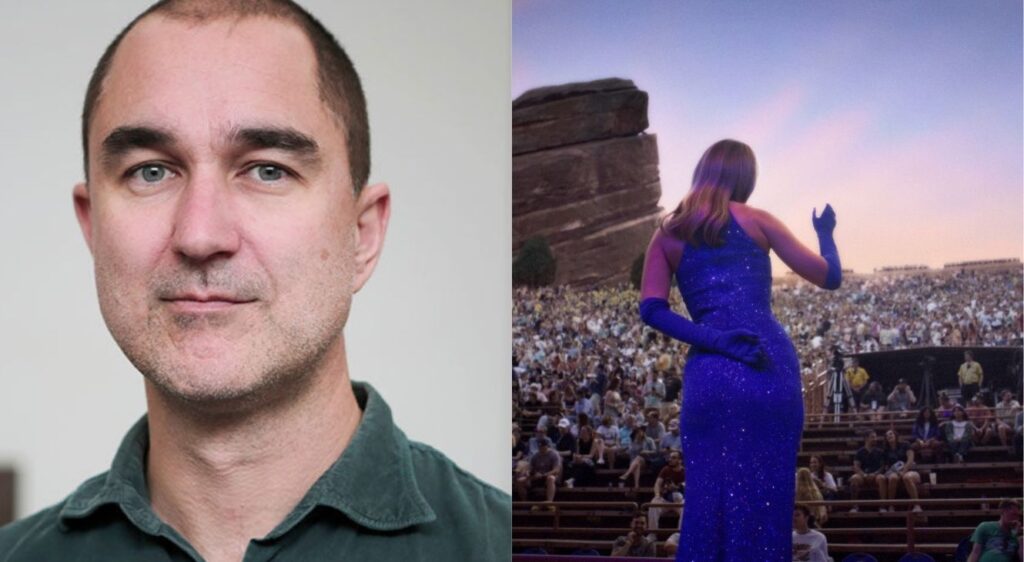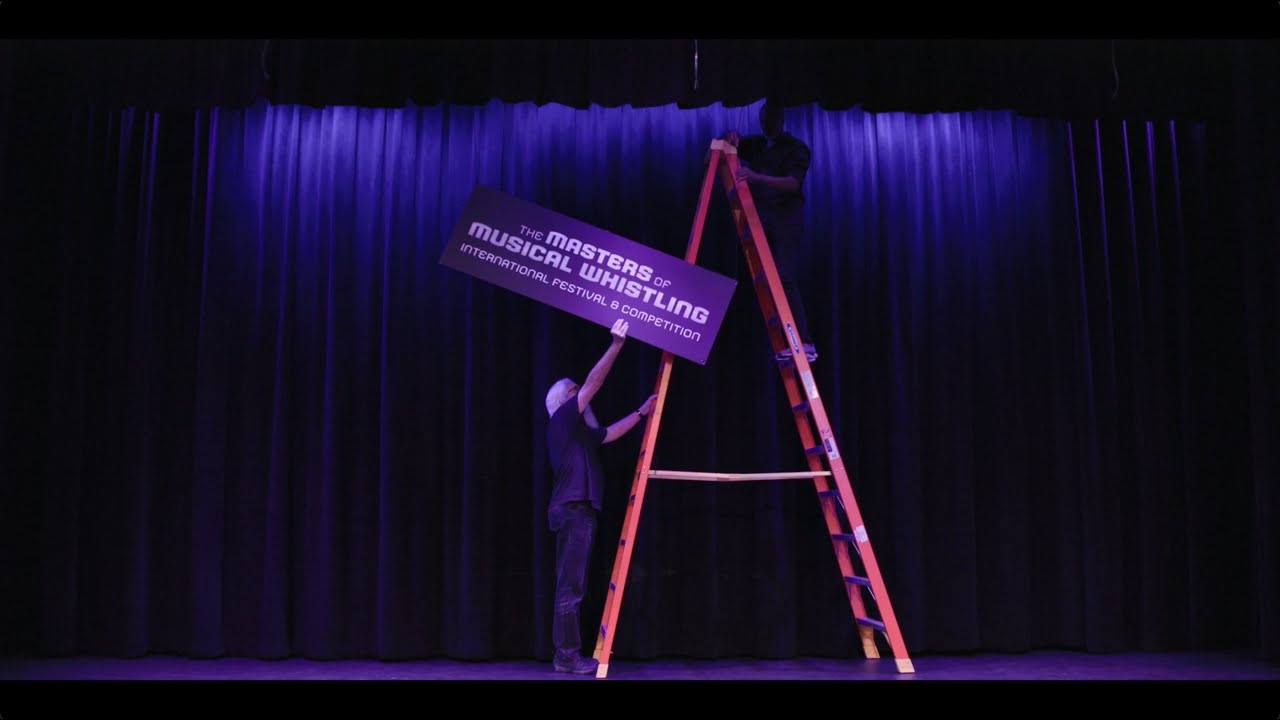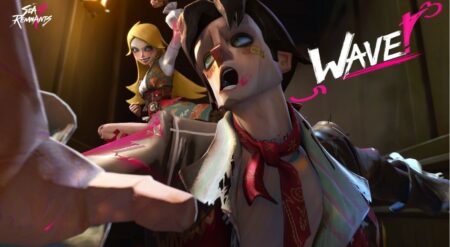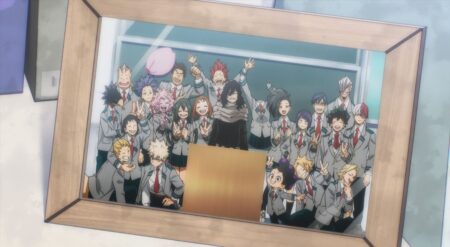Documentaries cover a wide range of subjects. However, this genre of filmmaking itself is occasionally pigeonholed as covering incredibly serious and sometimes even dark subject matter. With the arrival of director/writer Christopher Nelius‘s latest documentary, Whistle, to TIFF, viewers everywhere will not only get a lovely introduction to the world of musical whistling but will also be reminded that documentaries can be light, fun affairs.
In Whistle, the documentary predominantly focuses on the 2023 Masters of Musical Whistling competition. Produced by the “Whistling Diva” Carole Anne Kaufman, this labor of love welcomes whistlers from all over the world a chance to compete for the title of ‘Master of Musical Whistling.’ Viewers will be introduced to a diverse range of whistlers, from the viral social media sensation Molly Lewis to contestant Yuki Takeda, a competitor who consistently finishes second or third place, offering a heartwarming and competitive glimpse into this subculture.
We spoke with Whistle director/writer Christopher Nelius, producer Camilla Mazzaferro, whistling competitor Lauren Elder, and the producer and Artistic Director of the Masters of Musical Whistling competition and whistling activist, Carole Anne Kaufman, at the Toronto International Film Festival. Throughout the course of the discussion, we discussed how Nelius and Mazzaferro discovered the world of whistling, the lessons learned from the 2023 competition, and where the future of whistling may go.
BUT WHY THO: How did you come upon the whistle competition, as well as just narrowing down whistling and this glorious competition that’s the central focus for your documentary?
CHRISTOPHER NELIUS: I have a music background myself. I used to be a musician coming out of high school, and then I was a composer for a while, and then I decided to concentrate on filmmaking. I’ve always wanted to make a music film, but no stipulation beyond that, just like something to do with music.
I’ve worked with Songbird Studios, which is Camilla [Mazzaferro]’s company. We’ve worked on a project together before, and we have worked closely over the years. Actually, they had found, through the development process, they had come across the Masters of Musical Whistling competition, and also Molly Lewis, because Molly has quite a high profile in terms of being a whistler.
When Camilla and Luke [Mazzaferro] from Songbird brought this idea of this world of the Masters of Musical Whistling to me, I was just immediately drawn to it for a few different reasons. One, because I love films that take you into a world. You can call it a subculture or whatever, but I love those really immersive stories that take you into a world that maybe you didn’t realize existed.
And then when I started looking at some of…because there is a bunch of stuff online. I started looking at some of the whistlers and hearing what they can do, and thinking, wow. It’s such an eccentric group of people. But then you hear some of the whistling, and as a musician myself, I was blown away by some of it. Your first impression is, Oh, this is a novelty. But then, when you actually hear amazing whistling, it’s like a deeper level of appreciation of it actually being a musical instrument.
That’s when I realized that, if it piques my interest to do that, hopefully it matches an audience’s interest. And then when I met Carole, especially, and a couple of the other main whistlers – they’re almost like outsider artists. They’ve just got a great kind of take on the world and music and art and life, even. I just realized there was a beautiful combination of elements there to investigate.
But the thing with any documentary is you don’t know what it’s going to be like. There’s a certain leap of faith that you have to take, and including the guys at Songbird, you just go, ‘Okay, are we going to do this? ‘ All right. Let’s hold hands to do it. And I’m so glad we did it, because it was just a wonderful world to dive into and put on the screen, and really looking forward to our first audiences watching the film.
Whistle focuses centrally on the 2023 Masters of Musical Whistling competition and its participants.
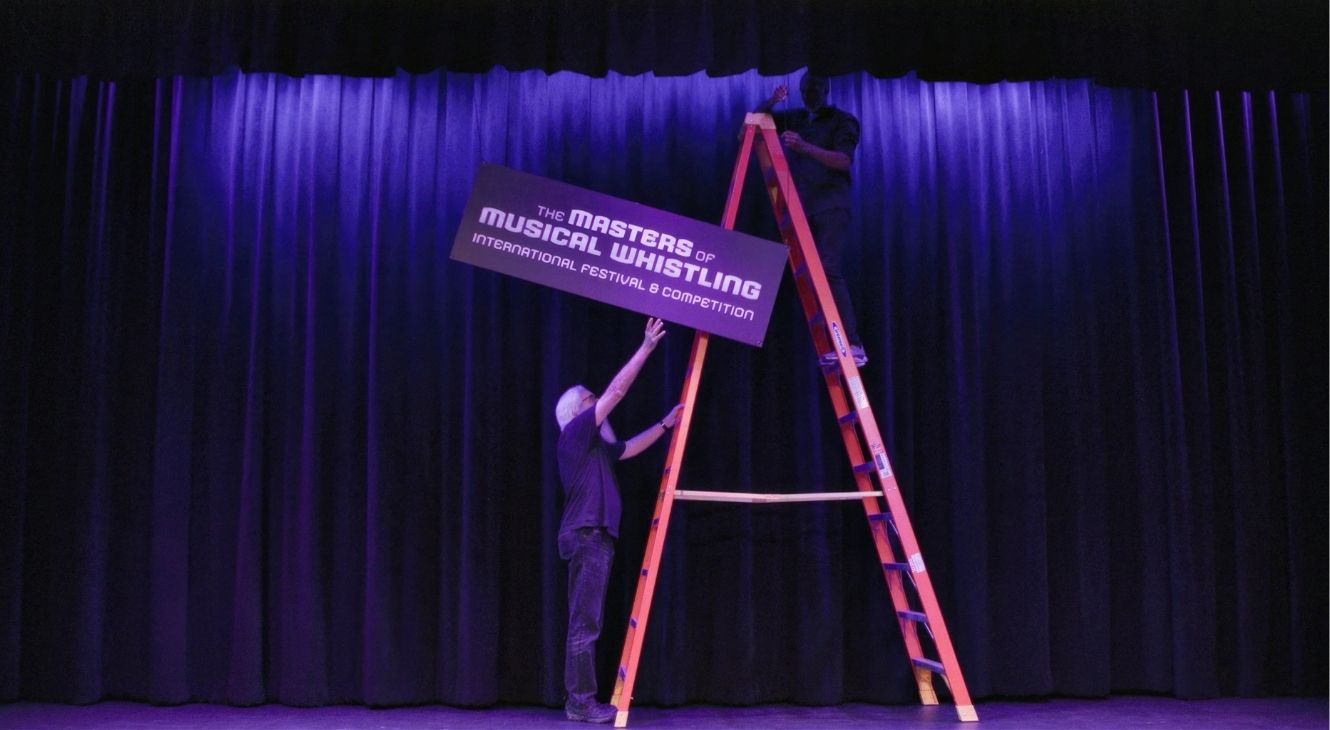
BUT WHY THO: Carole and Lauren, how did you guys come to be involved in Whistle?
CAROLE ANNE KAUFMAN: I got an email communication, and there had been quite a few over a couple of years. Just before that, I had gotten quite a few bites, with different documentary-style media outlets contacting us. I had already put a reel together for another company in New York. And then when I heard from Songbird Studios, I already had a little connection with Australia, so it was very exciting and wonderful, given that I’m a whistling activist. Anybody interested [in this] is very exciting.
So, when you have one conversation, you don’t really believe anything’s going to happen. Then you have a second conversation. It’s like, okay, well, hey, these conversations are happening. After that, they sent out a team of people to do a pre-packaged type of deal. And, at that point, it was, hey, we still don’t know. We’re just going to film some stuff and see.
At that point, I was already feeling confident. There are moments in life where you get centered, and you have your feelings. And my feeling was, this is going to fly. This is going to be an awesome experience, and that’s how it’s been so far.
And then, of course, once we got the green light, we started making other plans. We had another meeting and extensive interviews at my hair studio. And then, of course, we started making plans for everybody to come out during the whistling festival itself in 2023.
BUT WHY THO: What about you, Lauren?
LAUREN ELDER: Yeah. Same. I got an email out of the blue asking if I was going to be attending the next competition and saying we might be filming a documentary. Are you gonna go? And I was like, Well, okay, I wasn’t planning on it, but this sounds fun, so why not? And then, there were Zoom interviews and all of that.
When the competition was happening, they came out and filmed so much of our lives. And then the crew came and met me in New York, because I’m a bi-coastal performer, I got to film some of my New York Life too, and now here we all are again. So cool.
BUT WHY THO: And then, in terms of producing documentaries, how does that actually happen, Camilla?
CAMILLA MAZZAFERRO: A lot of faith. We were so lucky with this whole community, who just welcomed us with open arms, which you don’t always get. Our first introduction to the world was an Australian whistler, Molly Lewis, and I actually, when I first saw her, I spotted a friend who’s a mutual friend, as a backup singer on [Lewis’s] website. And I was like, I think I know how to get to Molly, and she’s Australian. We’ll go and be friendly. And she was so open.
Then she told us about you, Carole, and we reached out, and it just, you were so welcoming and brought us into this community, and so that is a huge help.
Really, the biggest challenge with this film was just getting financing behind it, and getting people to believe that this is a documentary that is important. There are so many documentaries out there at the moment about incredibly important subject matters, and so many of them are at TIFF. This film really is meant to be joyful, and it’s spreading this kind of passion and enjoyment in creativity.
It’s been a couple of years of trying to show people that it’s also important, and it’s all so worthy of making a documentary about. As we went through the process and the editing started to come together, people slowly began to see it and started believing it as well. It’s amazing to have this kind of groundswell of people who have seen early test screenings, and they’re getting a really lovely response.
For these guys who kind of trusted us the whole way through, believing that we wanted to celebrate their art form, and we wanted to sort of capture this world of, like, yes, quite eccentric people from the outside, but like you say, there’s almost somebody that everybody can relate to in this community.
That’s what makes it truly special. Everyone sees a little bit of themselves in one of the competitors, and everyone who watches it has a favorite one that they’re rooting for, and that’s what’s really fun about it.
BUT WHY THO: I actually really appreciate the lighter subject matter, because a lot of what I generally review is really dark. So, Whistle ended up being a palette cleanser that I desperately needed.
CAMILLA MAZZAFERRO: We’re hearing that a lot. This is the kind of film that people need right now, and it’s all right to spend some time watching a film about people just celebrating and enjoying an art form and following their passion. No matter what anyone thinks, it’s a really enjoyable way to share a film together and be inspired.
CHRISTOPHER NELIUS: I think it’s a good point, though, about documentary as well. I’m a huge fan of films like American Movie and even The King of Kong. When those films came out, it was just so…documentary can be labeled as earnest. A lot of the time it doesn’t. It’s not that. It’s as varied in emotional and even genre range as narrative films. And so, it feels really good to be able to bring a film to a festival like Toronto that has that flavor to it and reminds people that the real world doesn’t all have to be anxiety-inducing, like it could be joyful as well.
BUT WHY THO: You mention anxiety, though…
CHRISTOPHER NELIUS: There is a dog-eat-dog competition element to this. These whistlers would do anything to win the world championship. So there’s that too.
CAMILLA MAZZAFERRO: Serious competitors.
Check out this exclusive clip showing Carole and fellow volunteers setting up the Masters of Musical Whistling competition.
BUT WHY THO: Even still, there was definitely a sense of camaraderie, kinship, and good vibes from the competition, which was refreshing. In terms of the 2023 competition, what did you both take away from it? Whether, in your case, Carole, it’s not just about making the event better, but about how to better streamline it. And Lauren, in terms of anxiety and just getting it out there.
LAUREN ELDER: Gosh, what a question. When I think back to that competition and everything that happened, I wish I had spoken up more. There were times that I had wanted to change my songs, and I thought that because you [Carole] had set that, I’m not always a rule follower, but when it comes to things like this, I’m like, I will follow your rules if you set them out.
There was a specific date you had to have your songs in. And I was like, going back and forth. This is very typical of me, to go back and forth with my decisions. And I finally was like, Okay, I’ll just do those. And then, like, a week later, I was like, No, I want to do this, and I could do this song, and I didn’t get in touch.
I wish I had, because then I found out at the competition, people were like, Oh no, I changed my song at the last minute. I was like, What? I could have done that? And I wish I had. I think back on my song selections, and I’m not sure that I made the best choices. And so I wish I had been more bold to ask if I could have changed it. That’s probably one of the biggest things. And maybe I shouldn’t have loaned Ayna [Ziordia Botella] my chapstick, because I did loan her my chapstick.
CHRISTOPHER NELIUS: Can I jump in there? That is exactly what I love about the people in the film, the whistlers, is that there’s no prize money. You’re not winning $30,000.
LAUREN ELDER: No, we’re spending our money to be a part of this.
CHRISTOPHER NELIUS: But it means so much, and as a filmmaker, there are the classic kinds of things you’re worrying about, which are like, what are the stakes of the story? And are we gonna care? And I was like, is it a problem that there’s no prize money?
Once I met these whistlers, Ayna and Yuki [Takeda] and everyone, and I can see how much it meant to them to win, and it’s all because of this contest that Carole’s putting on. I was like, Oh, wow. The stakes are really high, and it was really interesting to see that money didn’t matter in that regard. To me, that makes these guys even more admirable and heartwarming, as it’s really about the music and performing well.
CAROLE ANNE KAUFMAN: It’s also about being fully self-expressed, about living your passion, about putting the attention to the areas that enhance your life, whether or not other people sanction it, or whether or not it has a big following already. There are many of us in the world who have passions, and if we wait for others to give us the green light, we wouldn’t have half the art that we have right now. Who knows what we would have?
For me, at the event, I learned a lot of what not to do. Every year, you have a great experience with that, and that event was improved from our past, and so all I can do is hope this year, from October 3 to 5, back at Barnsdall Gallery Theater in Hollywood, we’re going to do it again, and I’m already making plans for that load-in. I’m already trying to find volunteers. Please join us. We’d love to have you. If you’re willing to sweat, we’ll have you on the team.
For what it’s worth, it’s about being a contribution to the world in your way. We all want to do. It sounds very altruistic when you put it out there like that, but it’s really like any gift that you give to anyone. A lot of it is because it feels so damn good. And part of the reason it feels so good is that when we express what is deeply inside ourselves, it’s a really good feeling. What’s inside of me is wanting to do something with my life that makes a difference in whatever way I can.
So, there’s a sense of need, a sense of urgency, a sense of drive that comes with it. So, although it may appear altruistic on the outside, in many ways, it’s extremely selfish. I’m trying to make sure that I’m growing as an individual, becoming the person that I want to be. I’ve only got another 40-50 years to be who I think I can be. So I want to be doing everything that I can.
BUT WHY THO: And where do you guys think the future of whistling is heading?
CHRISTOPHER NELIUS: There is a film from like 25 years ago about the former world championships of whistling called Pucker Up—great, great documentary. And what you really notice the difference with these two films, and I think this is a credit to Carole’s work with the Masters of Musical Whistling, is the old contest in Louisburg, the average age of the whistler was probably about 65. Then you see our film and the Masters of Musical Whistling; it’s a whole new generation of young whistlers.
That was part of what attracted me to it as well: there’s actually a groundswell of passion for the art form. I don’t know where it’s come from, or how it’s come to be, but isn’t this interesting? This film, hopefully, will help to bring other whistlers out of the woodwork and into the limelight. Because, like Molly is clearly the sort of pop star of whistling, if you like, and has made it into a career, and she’s touring and supporting around North America and stuff like that.
Isn’t it exciting to think that there can be more versions of that, but in their own sense of expression? It might be a different genre, but I hope the film inspires more interest.
Whistle had its world premiere at the 2025 Toronto International Film Festival. Interested in checking out the Masters of Whistling Competition live? It is taking place from October 3-5, 2025, at Barnsdall Gallery Theater in Hollywood, CA. Learn more here.

